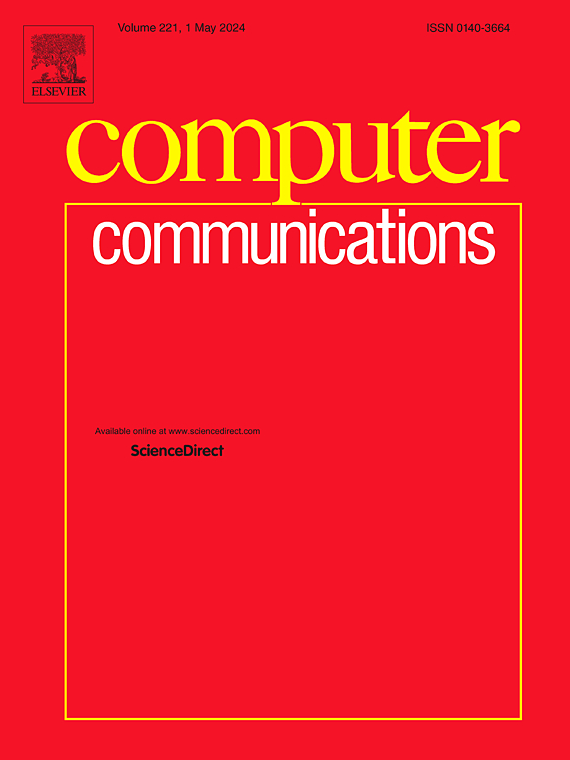Efficient blockchain synchronization mechanism over NDN based on directed Interest forwarding
IF 4.3
3区 计算机科学
Q1 COMPUTER SCIENCE, INFORMATION SYSTEMS
引用次数: 0
Abstract
Blockchain technology, as a decentralized technology, has been applied across various industries due to its immutability and information security features. With the increasing adoption of blockchain technology, network scale and transaction volumes have increased rapidly. The growing data transmission demands have exposed network performance issues in blockchain systems, creating a bottleneck for further improvements. While Named Data Networking (NDN) offers strong support for blockchain networks, some existing designs lack efficient synchronization methods, resulting in redundancies and limiting the full potential of NDN in blockchain networks. To address this issue, this paper proposes a directed Interest forwarding-based synchronization mechanism for NDN-based blockchain networks. In this mechanism, we design a Block Synchronous Forward Table (BSFT) to record the synchronization status of upstream and downstream nodes. Through the structure of this table, nodes can obtain information about other nodes in the network via six specifically designed NDN Interests. During synchronization, nodes dynamically select the appropriate peers to send data request Interest based on the actual network state and synchronization status, thereby reducing the large number of redundant Interest packets and corresponding response Data packets caused by Interest broadcasts. Experimental results demonstrate that our proposed synchronization mechanism can effectively reduce network traffic, lowering traffic by about 30% or more compared to traditional IP-based blockchain and other NDN-based blockchain solutions. This also accelerates the synchronization of Data packets across the entire network, thereby enhancing the overall performance of blockchain networks.
基于定向兴趣转发的NDN高效区块链同步机制
区块链技术作为一种去中心化的技术,由于其不变性和信息安全的特点,已经被广泛应用于各个行业。随着区块链技术的日益普及,网络规模和交易量迅速增长。不断增长的数据传输需求暴露了区块链系统中的网络性能问题,为进一步改进创造了瓶颈。虽然命名数据网络(NDN)为区块链网络提供了强有力的支持,但现有的一些设计缺乏有效的同步方法,导致冗余,限制了NDN在区块链网络中的充分发挥潜力。为了解决这一问题,本文提出了一种基于ndn的区块链网络的定向兴趣转发同步机制。在该机制中,我们设计了一个Block Synchronous Forward Table (BSFT)来记录上下游节点的同步状态。通过该表的结构,节点可以通过六个专门设计的NDN兴趣来获取网络中其他节点的信息。在同步过程中,节点根据实际网络状态和同步状态动态选择合适的对等体发送数据兴趣请求,从而减少了由于兴趣广播而产生的大量冗余的兴趣报文和相应的响应数据包。实验结果表明,我们提出的同步机制可以有效地减少网络流量,与传统的基于ip的区块链和其他基于ndn的区块链解决方案相比,可以减少约30%或更多的流量。这也加快了整个网络中数据包的同步速度,从而提高了区块链网络的整体性能。
本文章由计算机程序翻译,如有差异,请以英文原文为准。
求助全文
约1分钟内获得全文
求助全文
来源期刊

Computer Communications
工程技术-电信学
CiteScore
14.10
自引率
5.00%
发文量
397
审稿时长
66 days
期刊介绍:
Computer and Communications networks are key infrastructures of the information society with high socio-economic value as they contribute to the correct operations of many critical services (from healthcare to finance and transportation). Internet is the core of today''s computer-communication infrastructures. This has transformed the Internet, from a robust network for data transfer between computers, to a global, content-rich, communication and information system where contents are increasingly generated by the users, and distributed according to human social relations. Next-generation network technologies, architectures and protocols are therefore required to overcome the limitations of the legacy Internet and add new capabilities and services. The future Internet should be ubiquitous, secure, resilient, and closer to human communication paradigms.
Computer Communications is a peer-reviewed international journal that publishes high-quality scientific articles (both theory and practice) and survey papers covering all aspects of future computer communication networks (on all layers, except the physical layer), with a special attention to the evolution of the Internet architecture, protocols, services, and applications.
 求助内容:
求助内容: 应助结果提醒方式:
应助结果提醒方式:


